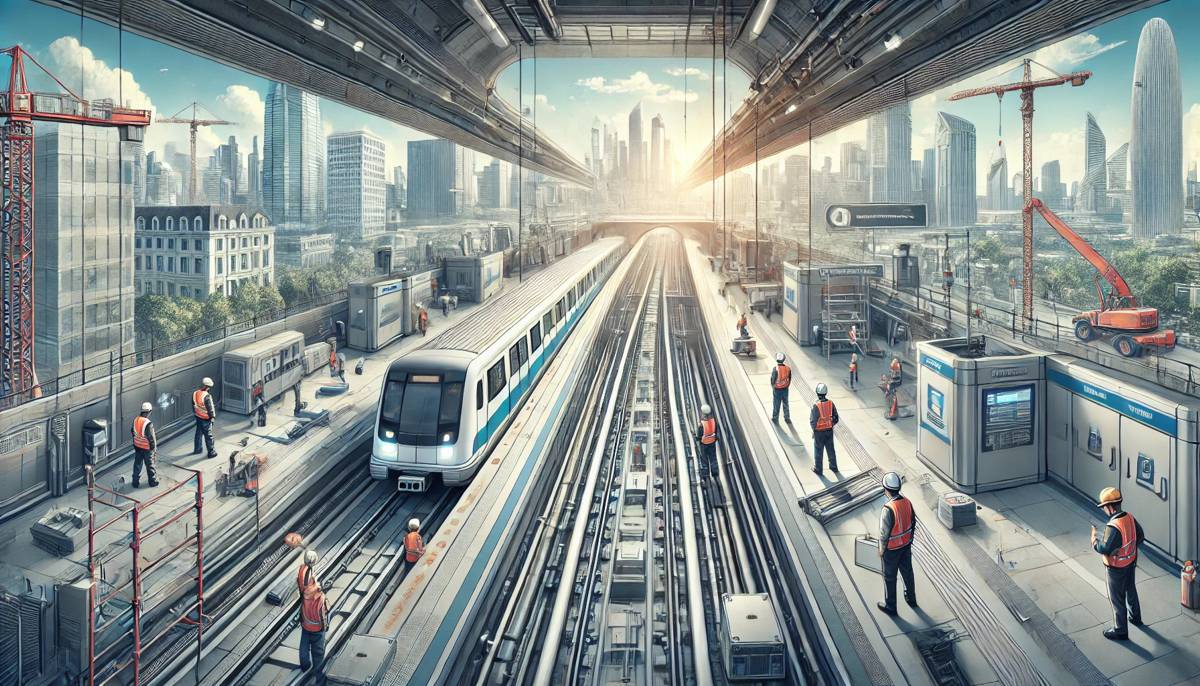SYSTRA Ibérica and META Engineering win key role in Barcelona Metro Expansion
SYSTRA Ibérica, in partnership with META Engineering, has secured a pivotal contract to design and deliver the automatic systems, signalling, and platform screen doors for the central section of Barcelona’s Metro Line 9.
This multibillion-euro project is set to transform urban transport in one of Europe’s most vibrant cities, marking a significant milestone in Barcelona’s metro expansion plans.
A Strategic Underground Connection in Barcelona
The new development aims to connect the northern and southern branches of Metro Line 9 through an 11 km underground section running through the heart of Barcelona. Spanning from the bustling university district to Sagrera, this critical stretch will feature 11 new stations, each equipped with 60-metre platform screen doors to enhance passenger safety and operational efficiency.
The line’s central section is not just an engineering feat; it’s an urban lifeline set to redefine commuting in the Catalonian capital.
Barcelona’s Metro Line 9 isn’t just any metro line—it’s the city’s deepest, with tunnels plunging to depths of up to 80 metres. The construction of this complex underground network was completed in early 2024, and now, the focus has shifted to equipping the tunnels with state-of-the-art systems, signalling, and safety mechanisms. Full service is projected to be operational by 2029, with the entire line fully completed by 2032.
Line 9 North and South
Currently, Metro Line 9 operates in two distinct sections. Line 9 North, which opened in December 2009, serves the route from La Sagrera to Can Zam, covering 4.9 km. Meanwhile, Line 9 South, inaugurated in 2016, connects Barcelona’s T1 Airport with the Zona Universitària, offering a vital link between the city centre and the airport.
The ongoing central section project will finally unite these two branches, providing a seamless connection across the city. By 2032, passengers will be able to travel quickly from the northern suburbs to key urban hubs like the Camp Nou stadium, Sant Pau hospital, and important districts such as El Prat de Llobregat, Santa Coloma de Gramenet, and Badalona.
SYSTRA and META Engineering’s Role
Winning the contract to supply and integrate cutting-edge systems for Line 9 is no small feat. SYSTRA Ibérica, a global leader in public transport engineering, and its partner META Engineering, are tasked with delivering a suite of advanced technologies. This includes automatic train operation (ATO) systems, complex signalling networks, and platform screen doors designed to enhance passenger safety at each station.
The platform screen doors, a critical safety feature, will extend 60 metres along each platform, acting as a barrier between the track and passengers until the train arrives. This technology not only improves safety but also boosts operational efficiency by reducing delays and maintaining a controlled environment within stations.
“Delivering the systems for the deepest and most complex section of Barcelona’s metro network is both a challenge and a privilege,” commented a representative from SYSTRA Ibérica. The integration of these systems is set to position Barcelona’s Metro Line 9 as one of the most advanced urban rail lines in Europe, showcasing the city’s commitment to embracing modern transport solutions.
Challenges Below the Surface
With tunnels descending as far as 80 metres below ground, the challenges of integrating these sophisticated systems are immense. The sheer depth and complexity of the tunnels demand precision engineering and meticulous coordination among various stakeholders. The construction phase faced numerous geological and logistical challenges, from navigating ancient infrastructure to managing water ingress in deeper sections. Now, the focus has shifted to the intricate task of system integration, where even the smallest error can result in costly delays.
Barcelona’s unique geography adds another layer of complexity. The metro tunnels weave through a dense urban fabric, passing below historical sites, bustling neighbourhoods, and critical infrastructure. Every installation, from signalling cables to screen doors, must be executed with minimal disruption to the city above, necessitating innovative engineering solutions and round-the-clock operations.
More Than Just a Metro Line
The completion of Metro Line 9 is expected to bring significant economic and social benefits to Barcelona. Beyond the immediate advantages of enhanced connectivity and reduced travel times, the line will serve as a catalyst for urban regeneration in several areas. The new stations will provide easier access to educational institutions, healthcare facilities, and cultural landmarks, fostering greater social inclusion and economic activity.
For businesses, the improved transport links mean easier access to talent and markets, particularly for companies located near the new metro stops. Meanwhile, the enhanced connectivity is likely to drive up property values in adjacent areas, further boosting local economies. By linking key urban districts and transport hubs, Metro Line 9 is set to become an essential artery in Barcelona’s public transport network.
Environmentally, the expansion of the metro network represents a crucial step in reducing the city’s carbon footprint. By encouraging more people to opt for public transport over private vehicles, the project supports Barcelona’s broader sustainability goals, helping to alleviate traffic congestion and reduce greenhouse gas emissions.
The Future of Urban Mobility in Barcelona
As the countdown to 2029 continues, the excitement around Metro Line 9’s central section is palpable. This project is more than just another metro line; it’s a statement of intent—a bold move towards creating a smarter, more connected Barcelona. The involvement of leading firms like SYSTRA and META Engineering underscores the importance of collaboration and technological innovation in tackling the urban mobility challenges of the 21st century.
The full realisation of this project will not only transform the daily commute for millions but also set a new benchmark for metro systems worldwide. With its cutting-edge technology and deep urban integration, Barcelona’s Metro Line 9 will serve as a model for cities looking to expand their own public transport networks in similarly complex environments.





























